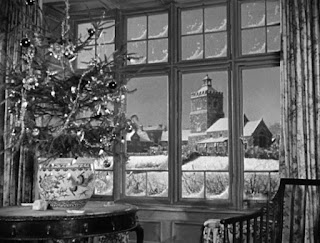Directed by George More O’Ferrall; produced by Anatole de Grunwald
The Reverend Martin Gregory is a rural vicar who seems to exist slightly detached from the rest of the world; absent-minded and good-humoured, he appears to prefer the abstract to the practical. His children, however, have to deal with the concrete: Jenny (Celia Johnson) longs to marry her boyfriend (John Gregson), but feels she must stay and take care of her father. Margaret (Margaret Leighton) lives in London with no desire to come home. Michael (Denholm Elliott) doesn’t take anything seriously but his desire to enjoy himself. This Christmas, however, will be different than any other for this loving but distant family.
A fine drama of personalities, The Holly and the Ivy benefits from very good performances from the four actors who portray the Gregory family, in particular Richardson, as the gentle and amiable patriarch. Support is capably given by Margaret Halstan and Maureen Delaney (credited as ‘Maureen Delany’) as two contrasting aunts, and Hugh Williams as a cousin. If there is a flaw in the casting it is that Johnson is too old for her rôle. Jenny is 31, while Johnson looks very much the 44 she was at the time. Her performance, however, makes up for any visual incongruity.
The script, by the producer, from a play by Wynyard Browne, is excellent. Initially, it gives the impression of a modern young generation a little exasperated with – though caring greatly for – the old fogey who is their father. But slowly, the viewer realises that Martin Gregory is rather sharp, and not the stereotypical country parson. If he is blind to his children’s worries, they are no more perspicacious about him.
Gregory’s vocation as a priest is at the centre of the plot, really, in that his children have grown up thinking that their parent is like someone from a story-book, an otherworldly pastor made of glass, that the whiff of indiscretion or scandal in the family might shatter. How they arrived at this conclusion, having lived with him for most of their lives, may only be guessed at. It may have something to do with their late mother. One can imagine that she took on the practical elements of the household, while her husband concerned himself with the spiritual.
Yet one sees, from Martin’s words and actions – and reactions – that he is not as unworldly as people may believe. (For instance, on Christmas Eve, Michael and Margaret, bored at the vicarage, go to the cinema; their aunts are appalled but the reverend expresses surprise at there being anything interesting showing.)
It becomes clear that the children are the short-sighted ones. The aunts both know that Martin could cope on his own, if he retired, and the cousin, half-way between one generation and the next, also sees the truth. There is a key line that might be a cri de cœur uttered by clergymen of every faith: “Why do you think I became a parson in the first place? Because I saw what life is like. Not because I didn't.”
Like the casting, the script has one fault, and that is that it ends a bit too abruptly. One cares about the Gregory family and their issues, and would like to see a wider resolution. This is a small quibble, though. The movie does not suffer for it.
The Holly and the Ivy is not the usual Christmas story, nor does it have the angst-laden, loud tableau of unlikeable creatures that normally populate a tale of dysfunctional families. This is a quiet film of secrets kept not from shame but from concern for others, and of revelation that makes a Yuletide merry.






























